The Checker Maven
The World's Most Widely Read Checkers and Draughts Publication
Bob Newell, Editor-in-Chief
Published every Saturday morning in Honolulu, Hawai`i
Noticing missing images? An explanation is here.
Getting Even

Marvin J. Mavin
Marvin J. Mavin, professional checkers superstar and Captain of the World Champion Detroit Doublejumpers, had gotten himself into serious trouble with his long-time girlfriend, corporate executive Priscilla Snelson.
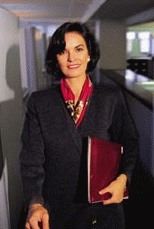
Priscilla Snelson
At her swank New Year's Eve party, Marvin had responded in what Priscilla felt to be an inappropriate manner to the advances of the Hollywood starlet known as Suzette Slinky. Priscilla threw both Suzette and Marvin out of her condo, and it was more than two weeks before Priscilla would even answer Marvin's phone calls.
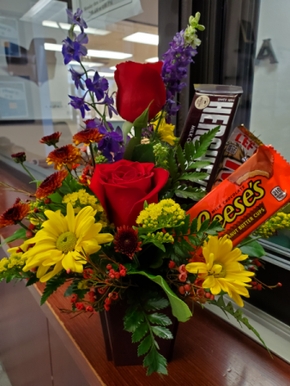
Marvin, of course, apologized profusely. He sent candy and flowers and his own homespun version of love notes. He even considered taking out newspaper ads asking for forgiveness. But in the end, Priscilla came up with an alternative.
"If you want to get back in my good graces," she told Marvin during a tense phone call, "you'll do what I ask."
Priscilla told Marvin was to appear at the Annual Meeting of the Women's Entrepreneur Network Communal Help (WENCH), a non-profit of which Priscilla was President. The theme of this year's meeting was "How Women Can Be Equal Partners in Professional Sports."

Yuko Hashimoto
But it was hardly as simple as just making an appearance. Priscilla, who had connections in very high places, arranged for Marvin to play a match with a rising Japanese checker star, Yuko Hashimoto. However, there was more to this than met the eye, though Priscilla wasn't letting on as to the full content of her plan.
Now, recall that Marvin had recently gone on trial for Misogynistic Microaggression Offending and Improper Gender Address in the court of the National Checker Federation. While Marvin won the case, most people thought it had been on a mere technicality and that Marvin had actually been in the wrong.

Tampa Checkerdrome
When Marvin appeared on the field in the Tampa Checkerdrome in front of 25,000 members of WENCH, he was greeted by a chorus of boos, jeers, and catcalls. Priscilla had told him what to expect, but Marvin was still taken aback.
"Aw, gee, folks," he said, being careful not to use the word 'ladies', "I ain't that bad."
This only made things worse. But when Yuko Hashimoto took the field, the booing subsided and was replaced by loud cheers and thunderous applause.
Marvin took a look at Yuko as she shook hands with him and then sat at the checkerboard. He was about to say something, but uncharacteristically thought better of it, and then the huge crowded hushed as the match began.
It was a tensely fought contest, and Marvin soon realized he was up against a top contender in Yuko. Finally, Marvin got what he felt to be a bit of and advantage, and thought he had a chance to win.
Marvin looked over at Yuko. He started to say, "Betcha can't ..." but the words caught in his throat as he pictured Priscilla glaring at him from her 50 yard line seat.
The position was as follows. Yuko was playing the White pieces.
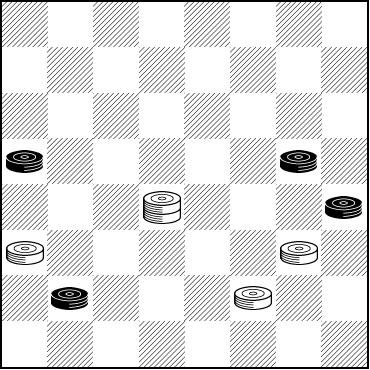
WHITE
White to Play and Draw
W:W21,24,27,K18:B13,16,20,25
Several minutes passed, with Yuko's gaze focused intently on the board. Then she looked up at Marvin. Her expression gave Marvin the shivers. Yuko didn't say a word and simply made her move.
Could you pull off a draw in this situation? Do you have Yuko's calm disposition and steady nerves?
This problem was sent to us specifically for this story by master problem composer Brian Hinkle. As our regular readers know, this means it will be a fine problem but not an easy one. The problem is Brian's modification of a correction to Ben Boland, as found by Jim Loy using the KingsRow engine.
When you're ready, click on Read More for the solution and the conclusion of our story.![]()
Beacon Cafe: Challenge Returned
"They solved it," Sal Westerman said, with obvious distaste. "They solved Ed's 'Kaleidoscope' problem. Now they say we owe them, and not only that, they sent us one in return."
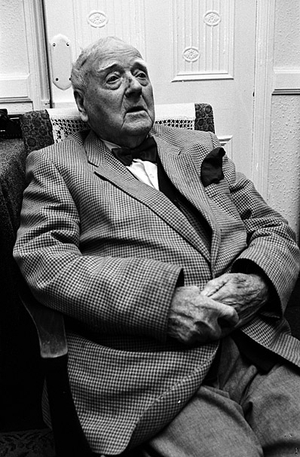
Sal Westerman
It was a Saturday afternoon in February, 1955, and the "boys" (who were all over 50 years old) were gathering as they always did in the Beacon Cafe in Bismarck, North Dakota. It was a blustery day, snow mixed with rain and an iron-gray sky, and Sal thought the weather suited his mood.
Sal was the unofficial leader of the Coffee and Cake Checker Club, which had been meeting at the Beacon for years. Recently, what Sal referred to as an "upstart" club had sprung up in Fargo (see previous Checker Maven story). They called themselves "Let's Have Another Cup of Coffee, Let's Have Another Piece of Pie" and they had challenged Sal's club to a checker problem solving contest. Sal sent them his Pennsylvania pen-pal's "Kaleidoscope" composition, and Don Steam, the Fargo club leader and a professor at North Dakota State University, soon afterwards sent Sal a letter in reply.
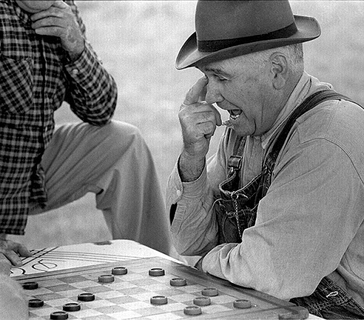
Don Steam
"Listen to what this character told me," Sal said. He was waving Professor Steam's letter around. "'Send us something challenging next time. Something worthy of our skills. The solution to your trivial problem is below, along with one for your club to solve. Which you won't, because you haven't got the chops."
There were mutterings around the table in the big booth at the back of the Cafe. Larry, Dan, Wayne, Delmer, and Louie were on hand today. "Pretty rude and arrogant," Delmer said.
"And not only that," Sal exclaimed, "they sent us a problem composed by Brian in St. Louis! I thought Brian was my pen-pal, but he's been two-timing us!"
"Easy now, Sal," Larry said. "Brian is a nationally famous grandmaster problemist. He probably corresponds with lots of people."
Sal shuffled a little in his seat. "I suppose," he said, "but does it have to be that bunch of scoundrels?"
"Let's see it," Wayne said. "We better get it. We all ready owe them for one round of coffee and pie."
"Yes, and this Steam character told me to send him five bucks," Sal said. "Imagine!"
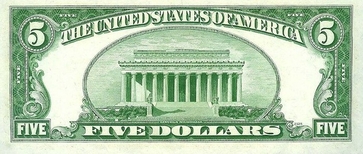
There was a low whistle from behind Deana's counter. Deana was the proprietor and a championship baker. She sold coffee for ten cents and her bars were two for a quarter. "Five bucks! Are there forty of them or something?" she asked. "But hey, I've got cherry granola bars today!"

"Sure thing," Sal said. "I'll buy a dozen. The boys need to be fueled up so they can crack this one."
"Thanks, Sal!" Wayne said, and the others added their agreement. "Now let's get at it!"
Sal laid out the following position on one of the checkerboards.
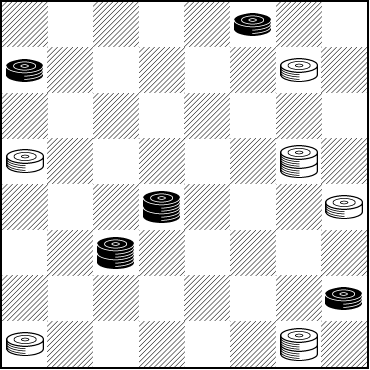
WHITE
White to Play and Win
W:W8,13,K16,20,29,K32:B3,5,K18,K22,28
"No time limit today, boys," he said. "We just have to solve it."
A large platter of bars and a fresh pot of coffee arrived at the table. The boys dug in while talking over the problem.
Would you be able to handle Professor Steam's--- or should we really say Brian's--- challenging problem? Another fiver is on the line, and in 1955 that represented a significant amount (almost $50 in today's terms). You too can take as long as you want and indulge in your favorite snack. When you're ready, click on Read More to see the solution and the rest of the story.
[Read More]Rebooting Checkers

Checkers is in need of a reboot. That's the opinion of Australian Richard Torning, and he has some original ideas about how to go about it.
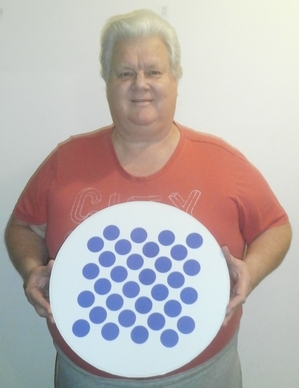
Richard Torning and "Roundsquare" Board
We can't argue with Mr. Torning's major premise. The fortunes of our game of checkers have been declining since the 1950s, when television became a big thing. You've heard it all before, about how the public considers checkers a game for kids and old men; that someone is playing "checkers" instead of "chess" when they need to up their game and move to a higher level; and the list goes on.
Mr. Torning wants to make the game more appealing, and to do so he's revived and modernized an idea that actually goes back more than 100 years but never really caught on: the "roundsquare" board. But instead of trying to fit a square peg into a round hole (or vice-versa), he's instead "circling the square" and the new board is just one part of a multi-pronged approach.
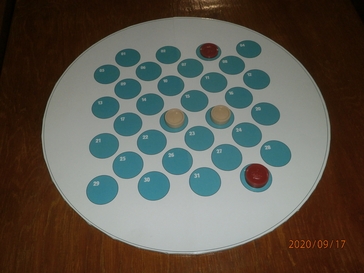
Numbered "Roundsquare" Board
We did an an-depth interview with Mr. Torning. You can read it all by clicking on Read More, just below the problem solution (please solve the problem first!), and we think you should. Mr. Torning has an insightful and appealing message for us. Not for him is yet another "modern" variant of the game that inevitably detracts rather than adds. His ideas are practical and cogent.
For one thing, he'd like to see a fresh start with the game renamed, and the name depending upon the language and usage of a particular area. He suggests Checkers-32 in the United States, Draughts-32 elsewhere in the English-speaking world, and so on, even going so far as to suggest a series of meaningful names to use among Aboriginal groups in Australia.
Of the "roundsquare" board, he says this: "The aim is to keep a minimalist approach to the game by further eliminating the 32 superfluous squares on the board but retaining the rules and shape of the two pieces. Instead of limiting the game to red/white or black/red pieces there is a need to make the game colorful, attractive, eye-catching, and simple to understand."
Mr. Torning's prototype boards are indeed very colorful and attractive and instantly attract attention. He also points out that using this board would uniquely differentiate our version of checkers from all others, and especially distance the game from chess.
Again, we urge you to read Mr. Torning's full remarks. He has also provided an interesting booklet, Early Australian Draughts Games, which you can download here.
The Draughts-32 idea is currently being prototyped at Minimbah Aboriginal School in Australia. Mr. Torning hopes to spread it far and wide and asks for your support by trying out the new board and the new ideas in your own checker playing community, and then becoming an ambassador.
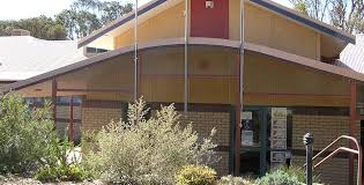
Building at Minimbah School
We can only wish Mr. Torning much success. Surely we would all like to see checkers have a vibrant and exciting future. Mr. Torning is working to make that happen.
And now, to "round" out today's column and "square" all accounts, here's a checker problem presented on a roundsquare board.
BLACK
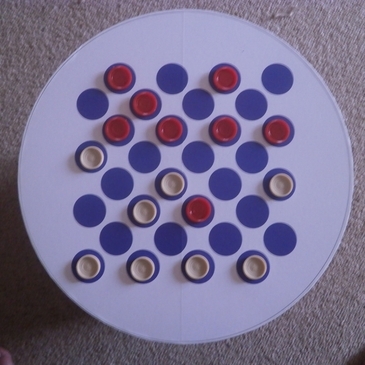
WHITE
White to Play and Win
W:W13,18,20,22,29,30,31,32:B1,3,6,9,10,11,12,23
See if you can get "round" to solving it, after which you can "square"-ly click your mouse on Read More to see the solution.![]()
Cute and Tricky

We think the title photo speaks for itself. This cute little one certainly seems to be up to something.
Today we have not one but two speed problems. The first one is very easy but quite cute.
WHITE
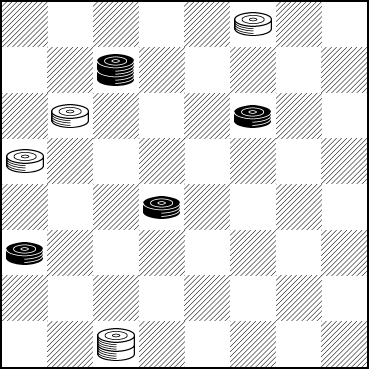
BLACK
Black to Play and Win
B:WK3,20,24,30:B12,15,22,K27
The second problem is a bit harder, but not much.
BLACK
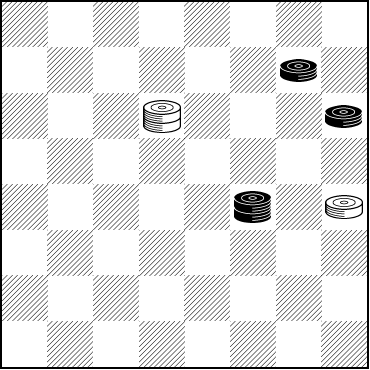
WHITE
White to Play and Draw
W:WK10,20:B8,12,K19
This problem could just as well have had the terms White to Play, Black to Draw. It's not at all difficult but it has a nice tricky little twist. You'll see what we mean when you solve it.
Are you tricky enough to solve a cute problem? (We won't ask you the implied inverted question.) When you've found the solutions, click on Read More to verify your solutions.![]()
Profile of a Checkerist: Anthony Bishop
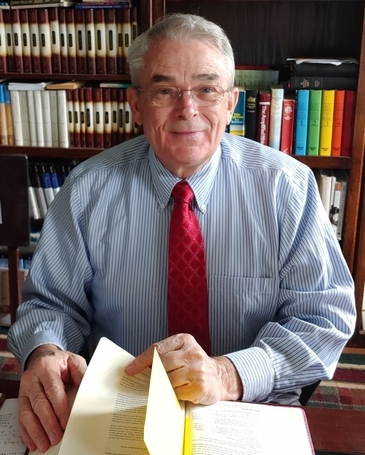
Anthony Bishop
Some years back we had the pleasure of meeting International Master Anthony Bishop, when he visited Hawai`i to take part in our one-time only, very small Hawai`i State Checkers Championship Tournament. Mr. Bishop won easily, of course, and landed the first prize of a $100 gift certificate from a local merchant. Gentleman that he is, Mr. Bishop turned around and gave his prize to a single mom who had taken part in the tournament. High principles and high quality of play are Mr. Bishop's hallmarks.
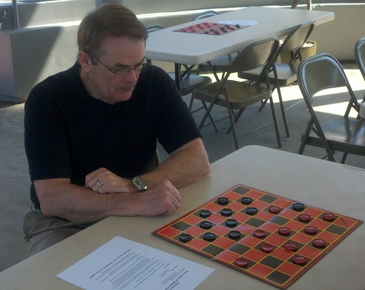
Mr. Bishop at the 2011 Hawai`i State Checkers Championship
You can read all about Anthony Bishop in his own words here. In a Saturday column we can only give a brief summary of the checker career of a remarkable man.
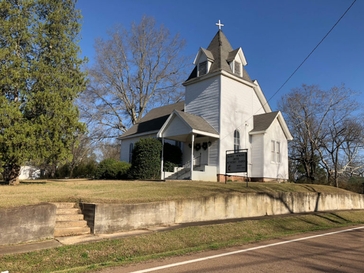
Hickory Valley, Tennessee
The town of Hickory Valley, Tennessee, where Mr. Bishop was born, may be small but it had an active and skilled checker playing community. Soon after he started playing, he made the acquaintance of a Tennessee grandmaster, Hugh Burton, a 38-time Tennessee State Champion. Mr. Burton became a lifelong friend and mentor.
Mr. Bishop started play towards the end of the Golden Age, and over the years made the acquaintance of all the greats: Tinsley, Long, Hellman, Lowder, Case, Banks, and many more. Mr. Bishop even worked for a while at Mr. Lowder's piano store as a piano salesman, remarking that with Elbert Lowder, there was never a dull moment.
Along with Mr. Lowder, one of the more interesting players Mr. Bishop ever met was Newell Banks, finding his skill and analysis abilities to be amazing.
Over the years, Mr. Bishop built up an outstanding checker library, eventually obtaining the collections of Arthur Reisman, Richard Fortman, Karl Albrecht, Hugh Burton, and Robert Shuffett.
Mr. Bishop views the 1978 publication of his extensive book The Encyclopedia of Checkers, to be his greatest contribution to the game. It's a book of photos and biographies of the checker greats.
He considers his highest playing achievements be consecutive wins in the 5th District Tournament over Hugh Burton and Lloyd Taylor in 1977, and over Lloyd Taylor in 1978. He has also competed in three international matches, obtaining excellent scores.
We asked Mr. Bishop for a favorite checker problem, and he offered this one by G. Slocum.
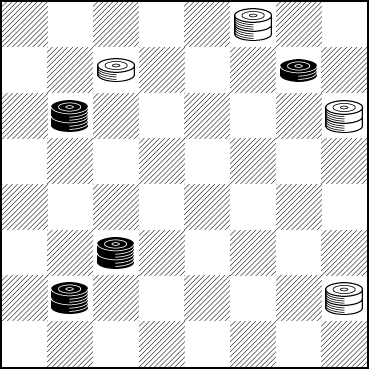
WHITE
White to Play and Win
W:WK3,6,K12,K28:B8,K9,K22,K25
Match wits with Mr. Bishop and Mr. Slocum and see if you can solve this amazing problem. You can check your work, as always, by clicking on Read More. ![]()
A Rival Club
Sal wasn't happy. That didn't happen very often, and just about never on a Saturday afternoon at the Beacon Cafe in Sal's home town of Bismarck, North Dakota.
Every week during the checker season, Sal and "the boys"--- a group of checker enthusiasts who were all over 50--- met at the Beacon for an afternoon of checker fun, enhanced with the great baked treats made by Deana, the proprietor. The group even called itself The Coffee and Cake Checker Club, inspired by a passage in one of Willie Ryan's books.
So what was bothering Sal on his favorite afternoon of the week?
"Some nerve those fellows have," he said. "Can't hardly believe it."
On hand today were Wayne, Dan, Louie, Larry, and Mike. Dan said, "'Let's Have Another Cup of Coffee, Let's Have Another Piece of Pie' --- it kind of has a ring to it, even if it is a bit on the long side."
As if on cue, the group, except for Sal, started humming the old tune of the same name[1].
Did Sal turn a little red? "Stop it, boys! Now cut it out, right this instant!"
The humming ceased and Louie said, "Gee Sal, I never saw you so upset before."
"How dare they!" Sal spluttered.
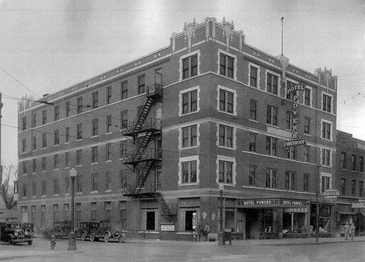
What had Sal so irritated is that a brand new checker club had started up in Fargo, North Dakota, about 200 miles east of Bismarck.. The Fargo group met at a coffee shop in Fargo's Hotel Powers, also on Saturday afternoons.
"They're just copying us in every way possible!" Sal said. "And then they presume to challenge us!"

Don Steam
In Wednesday's mail, Sal had received a letter from Don Steam, the leader of the new club, challenging Sal's group to a problem solving contest. The idea was that they would exchange problems and see who could solve the problem posed by the other group. Don closed the letter with, "The loser, which will be you, will send money to the winner--- that would be us--- to buy coffee and pie for our group. You haven't got an icicle's chance in August so we won't even talk about money for coffee and cake."
Sal had shared the letter with the group. "Yeah, they are pretty arrogant," Wayne said. "What they need is a good lickin'! Well, over the board, I mean."
"German chocolate cake today," Deana called out from behind her counter. "No pie!" Deana never missed a word that the boys said and was always on top of her marketing game.

"Well, boys, how about you try out this one from Ed," Sal said. Ed was Sal's checker pen pal in Pennsylvania. "Let's see if it's tough enough to show those braggarts in Fargo a thing or two. Ed calls it Kaleidoscope."
Sal, after a few deep, calming breaths, set up the following position on one of the checkerboards the boys had put out.
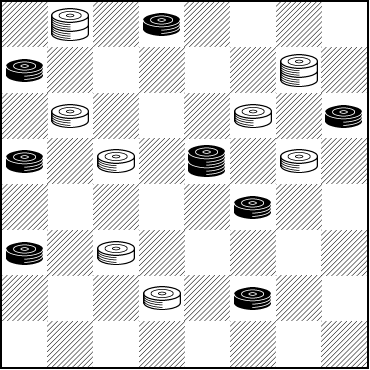
WHITE
White to Play and Win
W:WK1,K8,9,11,14,16,22,26:B2,5,12,13,K15,19,21,27
"See what you think," Sal said. "If you can win it, I'll buy the coffee and cake, but we'll have to find something harder to send to those big-talking upstarts. I'll give you, oh, half an hour or so."
The boys nodded in agreement and set to work on the problem.
[1] Let's Have Another Cup of Coffee is a famous song by Irving Berlin, first heard in 1932 in the show "Face the Music."
Is this problem tough enough to challenge the Fargo bunch? Take as long as you like and have some coffee and cake if you wish. Then click on Read More for the solution and the rest of our story.![]()
Dangling

Our heroine above is dangling above --- well, we don't know what. A bottomless ravine? A pit filled with rattlesnakes? A fiery inferno? We can only hope that she finds a way to safety.
Similar situations come up in the game of checkers. Sometimes, a piece is dangling and can't be rescued. Or it might suffer a different fate, or something else altogether.
There's a point to all this. Today's Checker School entry is a very old problem from Joshua Sturges. It isn't especially hard; indeed, it's just about a ten second speed problem. But it's very instructive and rather neat. After you've solved it, you may see why this column has the title that it does, and that "dangling" can have an alternative meaning.
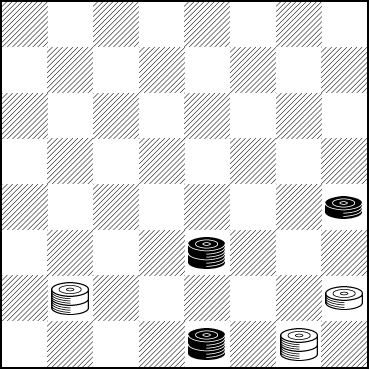
WHITE
White to Play and Win
W:WK25,K32,28:BK31,K23,20
The problem is found (among many other places) in the "Problems for Beginners" section of Andrew J. Banks' Checker Board Strategy. We're not sure if a complete beginner could solve it, but it's within reach of anyone above novice level.
Don't let the solution dangle; find it and click on Read More to verify your answer.![]()
On the Banks of the Jordan

The banks of the Jordan River are fabled, from the days of biblical history right down to the present. The connection with checkers? Well, none, really, except that whenever we hear "banks of the Jordan" we think of the famous Jordan-Banks championship match, which although of biblical proportions, took place during the relatively modern days of November, 1914.
Played in Kansas City, Missouri for the then-fabulous prize of $1,000, the games were memorable and indeed commemorated in a fine match book. Let's take a look at the very first game, which was played after suitable fanfare and ceremony.
Banks had Black and Jordan had White. The 2-move ballot was 10-14 24-20.
| 1. | 10-14 | 24-20 |
| 2. | 11-15 | 22-18 |
| 3. | 15x22 | 25x18 |
| 4. | 6-10 | 26-22 |
| 5. | 8-11 | 27-24 |
The game continued from here and went on to an eventual draw, as might be expected. But what if White had played 5. ... 28-24 instead? Would that have been a mistake, or just one of several alternatives?
5. ... 28-24 would have led to the following position.
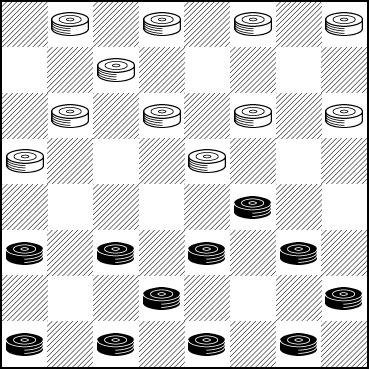
BLACK
Black to Play, What Result?
B:W18,20,21,22,23,24,27,29,30,31,32:B1,2,3,4,5,7,9,10,11,12,14
Would Banks have been able to bank on a win in this case? Of course, Mr. Banks never had to cross that particular Jordan, but it would certainly have been interesting. See what you make of it and then cross your mouse over to Read More to see the solution.![]()
Marvin J. Mavin: Another New Year's Eve
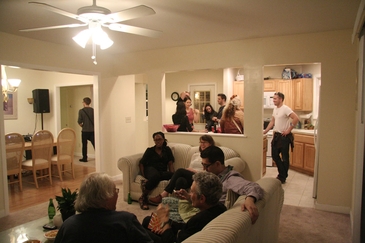
Marvin J. Mavin, superstar Captain of the Detroit Doublejumpers in the National Checker League, was once again at a New Year's Eve party at the swank condominium home of his girlfriend, Priscilla Snelson. As was the case last year, Priscilla, who was a C-level executive at Rust Belt Holdings, invited only the elite of the elite, a sophisticated, moneyed crowd of influential executives, politicians, business magnates, and even a couple of Hollywood stars.

Marvin J. Mavin
And Marvin. Who felt very uncomfortable. His idea of luxury consisted of a few cans of beer enjoyed while relaxing on a couch in front of the TV, clad in a sweatshirt and cut-offs. That wasn't going to happen at this upscale party.
Of course everyone present was passionate about checkers, the undisputed national sport, and so Priscilla had organized a little competition. Party-goers were invited to bring along a checker problem and attempt to "stump Marvin." The first one to do so would win a $4,000 bottle of French champagne, provided by Priscilla from her vast collection of rare wines.
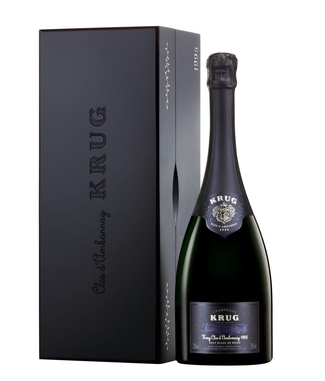
"You can buy a lotta beer for four grand," was all Marvin had to say. But when Priscilla told him to do something, he did it, and there was no further discussion.
During the evening, Marvin was presented various problems by the party-goers. He solved them all with little difficulty. Of course, his success was aided by the fact that Priscilla had told her serving staff not to give Marvin anything stronger than tomato juice, as she didn't want a repeat of last year's embarrassments (see previous Checker Maven story).
When the clock struck eleven, Priscilla's little contest was winding down, and would end just before the New Year rang in. No one had yet claimed the bottle of 1955 Champagne Krug Clos d'Ambonnay. But then Suzette Slinky (the stage name of a very famous Hollywood movie star) sashayed up to Marvin and batted her eyelashes at him. Putting her hand lightly on his arm, she said, "Hey, big boy, wanna try a real checker problem?"
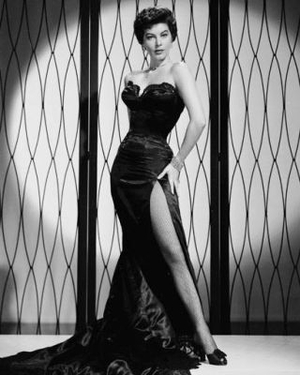
Now, Marvin and Priscilla had been in a relationship for quite a few years, and Marvin loved her dearly. But Marvin, being a guy like most guys, found someone like Suzette, well--- a little hard to resist. He smiled sheepishly and said, "Uh, sure, beautiful, whaddya got for me?"
Did Priscilla overhear him, or did her expression harden just a little, or did she turn in his direction for some other reason?
Suzette reached into her dress, such as it was, and pulled out a small slip of paper. "Here's something sweet for you, Marv," she said, as she ever so slightly touched her hip to his.
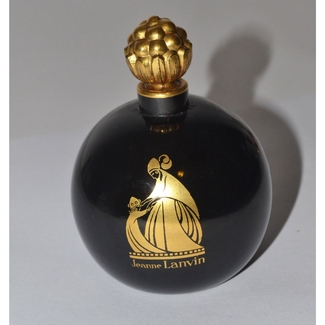
"Perfume," Marvin said, taking the paper from her hand and holding it near his nose. Their fingertips touched briefly. "Uh, yeah, I mean, a checker problem, right?"
"Sure is, Captain Marvin," she cooed. "You think you can solve my problem?" She put her arm around Marvin's waist and drew him closer.
Priscilla's expression, if had not changed before, surely changed now. She started across the room toward Marvin.
"Solve your problem?" Marvin said. "Oh, yeah, honey, I can ..."
"That's enough, Marvin," Priscilla snapped. "And as for you, Miss Slinky Hussy, you can leave right now!"
"Marvin, are you going to let her talk to me like that? Won't you protect me?" Suzette said, pulling Marvin even nearer and pouting at Priscilla.
"Hey, Prissy, you shouldn't ..." Marvin began, but he was immediately interrupted.

"OUT! NOW!" Priscilla pulled Marvin away from Suzette's grip and held him by his collar. "OUT! OUT! OUT!"
"Well, if that's how you are, Priscilla, and Marvin, if you're too afraid to say anything ..."
"OUT!"
"I'm leaving," Suzette said, "don't worry. And don't think this won't be in the Movie Star Tattler tomorrow morning! You'll see, Miss Priscilla."
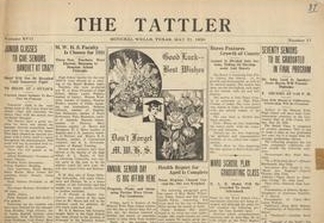
Priscilla kept her grip on Marvin's collar until Suzette made her exit and her stunned guests returned to their drinks and conversation. Then she dragged Marvin out to the kitchen, opened the service door, and propelled him into the corridor. Still holding on to him tightly, she called for the service elevator, shoved Marvin inside, and closed the door.. Through the door he heard, "Call yourself a taxi. You're not coming back to my place."
The elevator descended to the ground floor and Marvin stumbled out. Another door led him to an alleyway where he promptly tripped over some debris and landed in a pile of trash.

He started to shiver. It was cold in the alley, and just then he realized he had left his cell phone in his coat in Priscilla's hall closet.
Oh well, there was a bar he knew of nearby, where he could have a couple of beers and drown his sorrows. The bartender would get him a taxi. He would make up with Priscilla in a few days, although he knew it wouldn't be easy, and he would have to grovel ... a lot.
It was only very late the next morning when, alone in his apartment, Marvin awoke and found that Miss Slinky really had given him a checker problem on that perfumed slip of paper, one that she had gotten from her Uncle Brian in St. Louis.
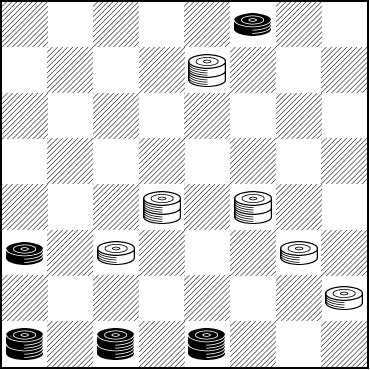
WHITE
White to Play and Win
W:WK7,K18,K19,22,24,28:B3,21,K29,K30,K31
Keep your mind on the problem, not on, um, other things, and you'll stay out of trouble as well as having a chance at solving this one. When you're ready, slink your mouse over to Read More to see the solution.
Happy Holidays 2020

Image courtesy greetings-day.com
This column will appear on December 26, 2020, and we hope you are all enjoying the holiday season. Whatever holidays you may (or may not) celebrate, we do hope this time of year will bring you whatever you may wish for, be that time with family and friends or just a chance to have a little break from the usual.
We like to draw from our favorite historical composers at this time of year, and today we turn to a prolific composer of days past, L. J. Vair. Mr. Vair originally lived in Denver and was known as "The Kolorado Kowboy." He also lived in Ohio, and in his latter years in Auburndale, Florida. Here is a problem that is said to be of a type in which Mr. Vair specialized back in the day.
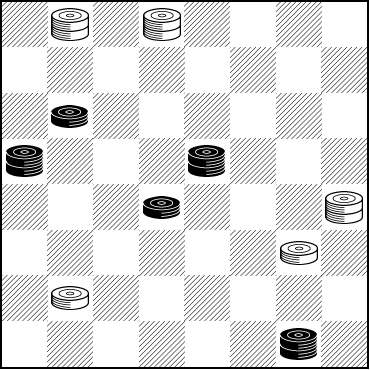
WHITE
White to Play and Win
W:WK1,K2,K20,24,25:B9,K13,K15,18,K32
This problem is bound to give you holiday cheer, even if you don't live in Colorado, Ohio, or Florida, and even if you're not a "kowboy." Take the time to work it out; it's a real pleaser. When you're ready, click on Read More to see the solution.![]()
The Checker Maven is produced at editorial offices in Honolulu, Hawai`i, as a completely non-commercial public service from which no profit is obtained or sought. Original material is Copyright © 2004-2025 Avi Gobbler Publishing. Other material is public domain, as attributed, or licensed under Creative Commons. Information presented on this site is offered as-is, at no cost, and bears no express or implied warranty as to accuracy or usability. You agree that you use such information entirely at your own risk. No liabilities of any kind under any legal theory whatsoever are accepted. The Checker Maven is dedicated to the memory of Mr. Bob Newell, Sr.

